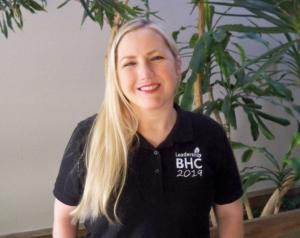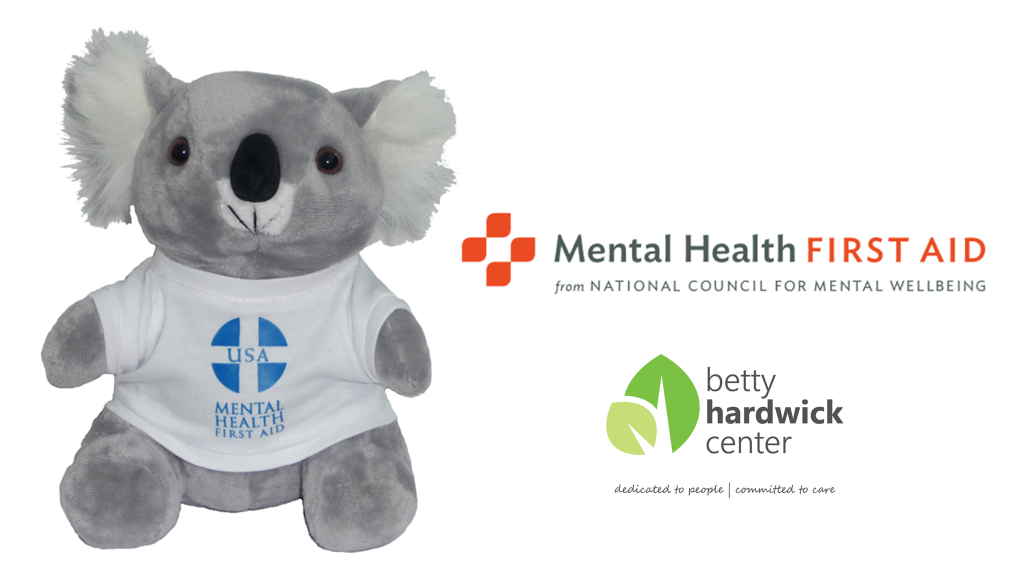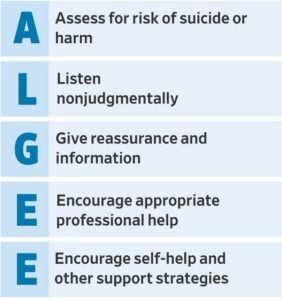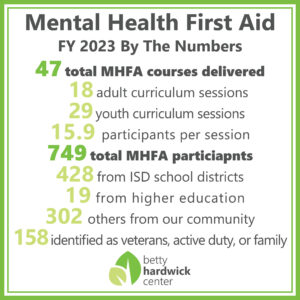Mental Health First Aid (MHFA)
MHFA Coordinator

Meet our MHFA Coordinator, Sandra Lang! She can answer all of your questions related to our Mental Health First Aid courses.
phone: (325) 691-2061
email: slang@bettyhardwick.org

What is Mental Health First Aid?
Most of us would know how to help if we saw someone having a heart attack—we’d start CPR, or at the very least, call 9-1-1. But too few of us would know how to respond if we saw someone having a panic attack or if we were concerned that a friend or co-worker might be showing signs of alcoholism.
Mental Health First Aid takes the fear and hesitation out of starting conversations about mental health and substance use problems by improving understanding and providing an action plan that teaches people to safely and responsibly identify and address a potential mental illness or substance use disorder.
Mental Health First Aid is a groundbreaking public education program that was developed in 2000 in Australia. It seeks to help participants recognize risk factors and warning signs of mental health challenges, build understanding of their impact, and briefly overviews common treatments. It uses interactive activities to demonstrate how to assess a mental health crisis; provide initial help; and connect persons to professional, peer and social supports as well as self-help resources.
MHFA seeks to demystify mental illness and help spread the message that there is hope. Recovery is possible, and help is out there. It can also be an important tool in early intervention. As First Aiders, we can #BeTheDifference in our communities.
Upcoming Courses
Mental Health First Aid is a course that teaches you how to identify, understand and respond to signs of mental illnesses and substance use disorders. The training gives you the skills you need to reach out and provide initial help and support to someone who may be developing a mental health or substance use problem or experiencing a crisis.
We offer three versions of the MHFA course.
- In-Person: this is the traditional one-day course.
- Virtual: self-paced pre-work followed by a shortened instructor-led Zoom session.
- Blended: self-paced pre-work followed by a shortened in-person instructor-led session.
Keep an eye out here or our social media pages for future dates open to the public
July 11, 2024
Adult MHFA – In-Person
https://www.eventbrite.com/e/adult-mental-health-first-aid-registration-912141408507
(registration closes July 1)
- You must be at least 18 years old.
- It will be held in person from 8am-5pm at the Betty Hardwick Center
- Class size is limited, and prior registration is required.
- If the course on Eventbrite is full, please get on the waitlist through Eventbrite or feel free to contact me, Sandra Lang, at slang@bettyhardwick.org.
August 5, 2024 – In-Person – MHFA for Military, Veterans, and their Families
or, use QR Code below to register.
You must be Military, a Veteran, or a Family member to attend.
- You must be at least 18 years old
- It will be held in person from 8am-4:30pm at the 436 TS Auditorium (might go until 5:00pm)
- Class size is limited, and prior registration is required
- If the course on Eventbrite is full, please get on the waitlist through Eventbrite or feel free to contact me, Sandra Lang, at slang@bettyhardwick.org. (Note: we recommend getting on the waitlist as people canx)
Click here for other courses offered in your area and registration information
Please continue to check our website and Facebook page for updates!
CEUs: Eight (8) clock hours — none for ethics — offered for LPC, SW, and LCDC students.
Virtual MHFA Courses – Frequently Asked Questions
Question – How is the virtual different from the fully in-person class?
The virtual option consists of 2 parts: the online self-paced prework and the “in-person” instructor-led virtual class.
Question – How do you access the prework?
It is accessed through the online MHFA Connect system. You will receive instructions on logging in and starting the prework once you have been registered for the class.
The prework takes approximately 2 hours and must be completed prior to the instructor-led virtual class. If the prework is not completed, the participant will not be able to attend the virtual portion and will not be able to receive certification.
Question – How long is the instructor-led virtual portion of the class?
The instructor-led virtual portion takes approximately 5 hours for Youth MHFA and 5.5-6 hours for Adult MHFA.
Question – Is a webcam required for the virtual portion?
Yes. Because this is considered an in-person training and is interactive, the participants need to have access to a webcam and be willing to leave the video on throughout the duration of the class. This is due to a requirement that the instructors be able to verify in-person attendance, and if the instructor cannot see you, they cannot verify attendance. Also, this class covers topics that can bring up tender emotions and the instructors need to be able to ensure that the participants are okay.
It is recommended that you access the internet using ethernet/landline as opposed to WiFi due to potential connectivity issues.
Question – How do participants access the instructor-led virtual class?
You will access the virtual class through the MHFA Connect system. There will be a place that will prompt you to launch the Zoom meeting.
Question – Do I have to register in advance for the virtual class?
Yes. The participants will be required to register in advance. The participants must be entered into the MHFA Connect system and assigned to the class in advance so that the participants can log in and complete the prework. This process can take time (and sometimes computer systems have technical difficulties), so unfortunately last-minute registrations cannot be accommodated.



